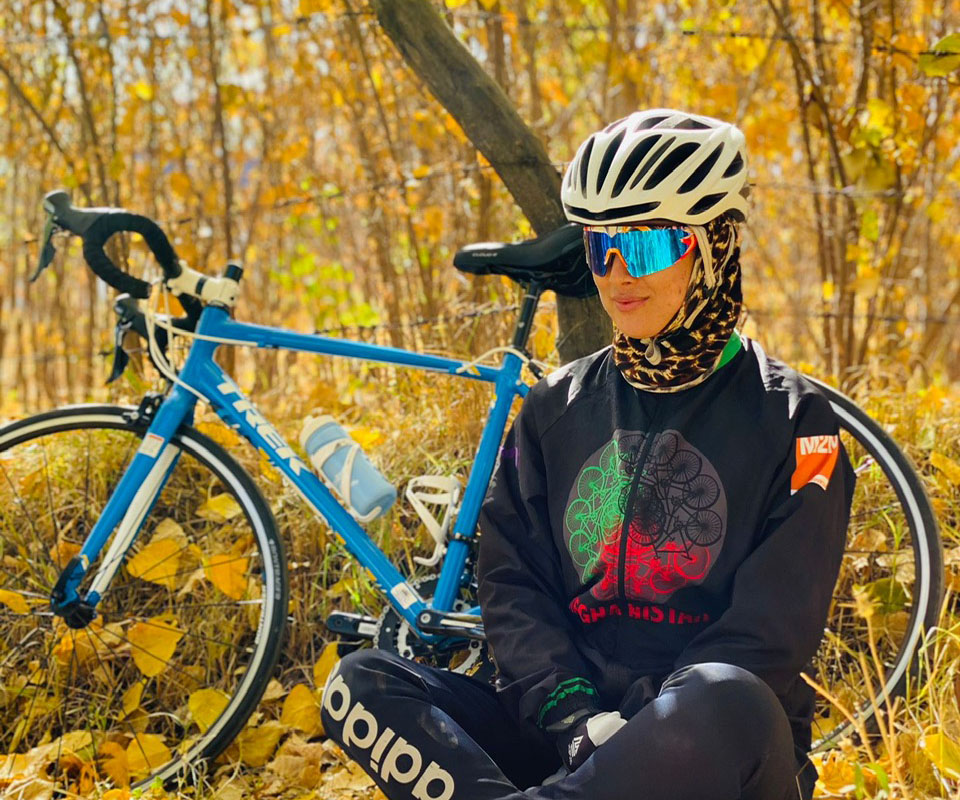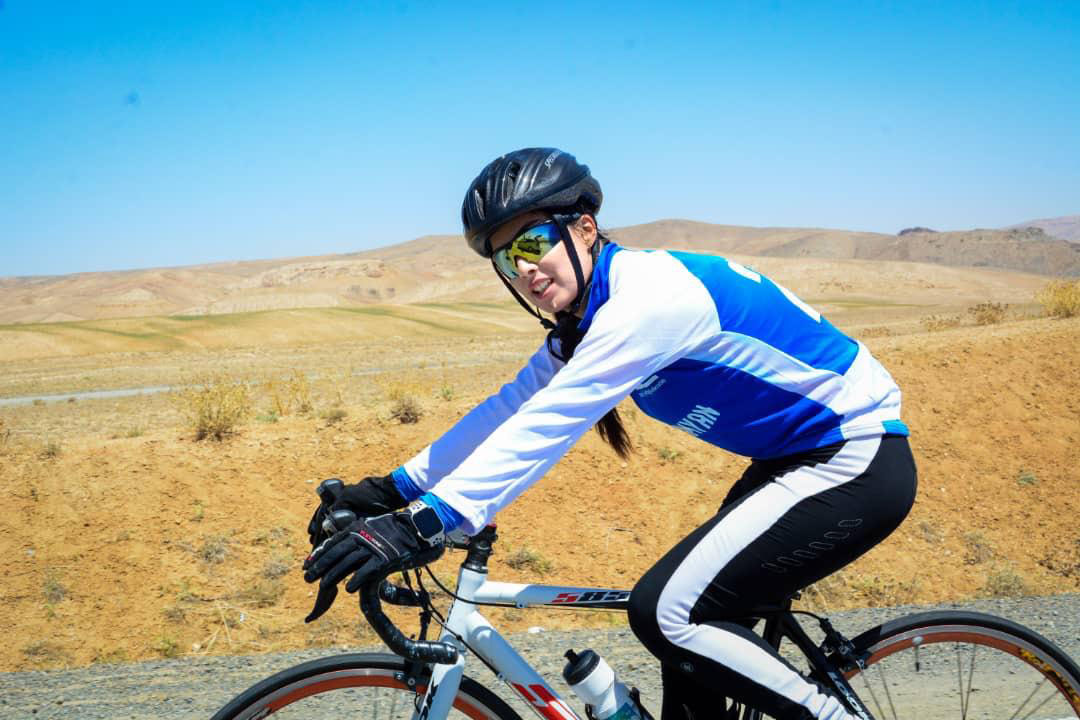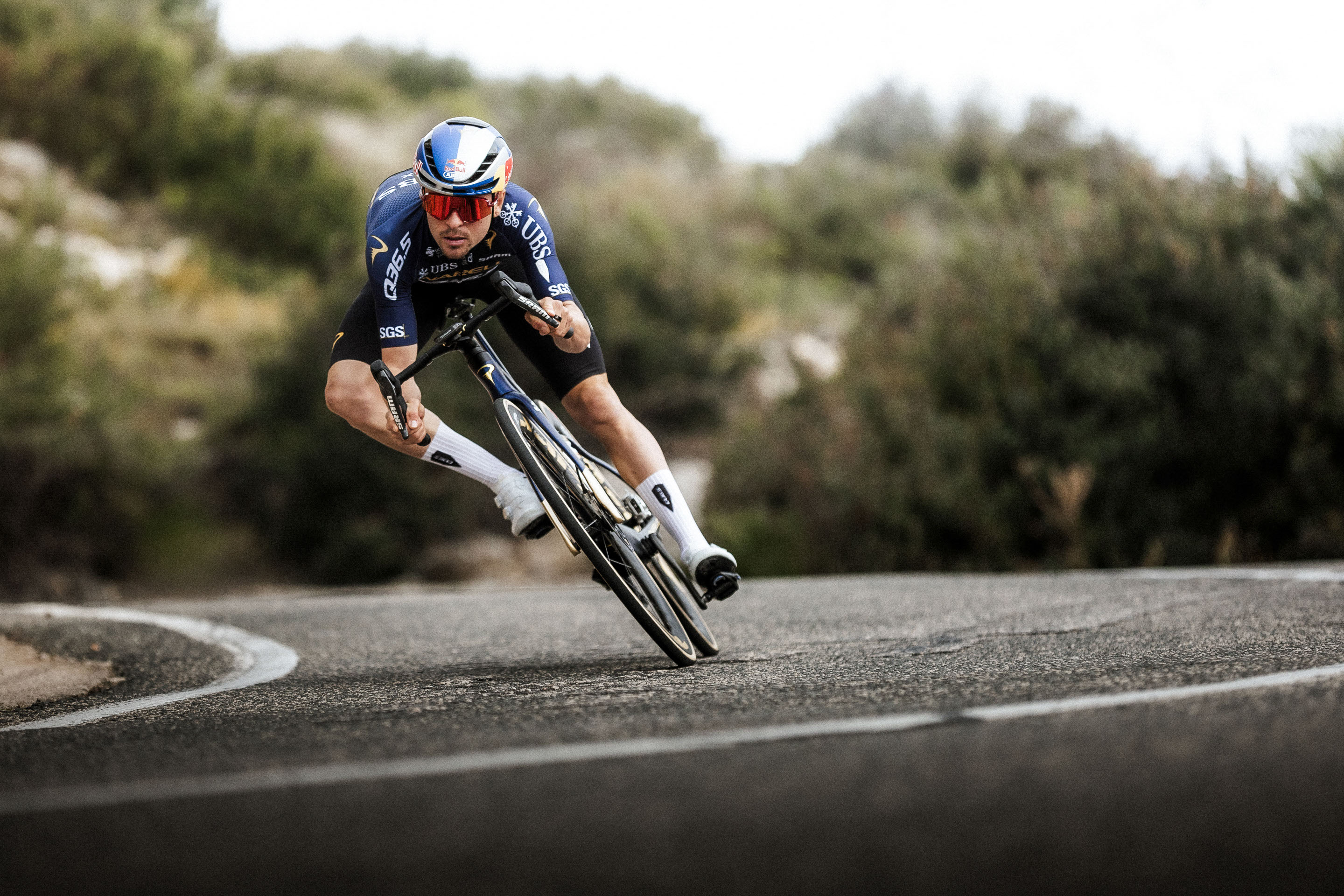Rukhsar Habibzai blog: Warriors on wheels
My passion for cycling, and having fearless team members on my side, helped us break gender taboos as the first females to cycle professionally in Afghanistan

Rukhsar Habibzai is the founder of Cheetah Cycling Club and captain of her nation’s first women’s cycling team, a group of ground-breaking women cyclists who were nominated for the Nobel Peace Prize in 2016 for their bravery and courage in defying gender taboos in Afghanistan. Born in the province of Ghazni, Habibzai was completing the dentistry programme at Cheragh Medical University located in Kabul when she was forced to leave her country as part of the mass evacuation of vulnerable citizens who faced targeted gender violence by the Taliban. Now living in Virginia, Habibzai is a dental assistant and racing for Virginia’s Blue Ridge Twenty24 Cycling Team in 2022.
I have cycled on the roads of a country with an endless history of war and corruption and where women and girls have no freedom to choose their careers or pursue their dreams. My passion for becoming a professional cyclist, and having fearless team members on my side, helped us break gender taboos by becoming the first females to cycle professionally in Afghanistan. In doing so, we set an example for young girls with dreams, and we inspired them to believe that they can do it, too.
With little to no support of any kind from the public, our cycling team transcended the extremely narrow-minded vision of our society and the strict cultural norms that often treat women as nothing more than property to own and use.
I can recall one of the first times I tried riding a bicycle in public. In the ninth grade of my school, I tried riding a bike from one end of the street to the other. I gained confidence and wanted to go further next time, but I heard a random man shout at me, "don't you have any shame riding a bike?" Those words struck me like a flash of lightning, and they took away the freshly gained self-confidence, which would later on make me hesitate to leave the house for a very long time.
Rukhsar Habibzai: An Afghan woman's journey of survival
Afghan Rukhsar Habibzai to continue racing with Twenty24 after relocating to US
Afghanistan: Right to ride revolution stops as women face targeted violence by Taliban
Afghanistan: Women cyclists fear being left behind with evacuation options dwindling
If I could meet that man today, I would thank him instead of curse him because those words also gave birth to a question that echoed in my head day and night: Why can't girls ride a bicycle just like boys do?
Asking this question became the reason that I am who I am today. I made it my mission to prove our society, which doubted the courage and ability of women, wrong.
A dear friend of mine heard about a federation for female cyclists on the radio, and I can still remember the surge of uncontrolled happiness I felt after she told me that they were open to accepting new members. That same day, my friend and I went to the general directorate of physical education and sports to find out more. It was my very first time leaving home without my brother, mother or father accompanying me, and without my family's permission.
The latest race content, interviews, features, reviews and expert buying guides, direct to your inbox!
By coincidence, I ran into the head of the cycling federation. My friend and I approached him with a mix of hesitation, surprise, happiness and asked him if we could be a part of the team. After hearing about our passion and enthusiasm for riding bicycles, he gave us a kind look and said he was happy to have met us. To our surprise, he told us that he had turned his house into the office of the cycling federation.
My mind latched on to worries and questions; Would my mom let me ride a bicycle in public? What would my dad and brother think and say to me?
The man gave us the address and his contact information, but before leaving, I asked him, "Excuse me, sir, what does a person need to become a professional cyclist?" He only asked that we show up. In my excitement, I blurted out, "Does that mean that we are on the team?" The man smiled and said, "Yes!"
I cannot express the joy I felt at that moment nor the fear of convincing my family to support me in this decision.
I told my mom, who thought I was joking at first, but she later confronted me about my choice to join the cycling team. Initially, my whole family stood against the idea of me riding a bicycle in public because they were concerned about the lack of security, strict cultural and religious boundaries, and the stigma attached to a female riding a bike. I begged my family to agree, but they said, "how can we allow our girl to ride a bicycle in such an insecure and strict society and send her to practice with a man whom we know nothing about?"

After days of constant pleading, I convinced my mother to meet with the head of the cycling federation. He visited our home and spoke to her. I remember him saying, "Don't let your child's talent go to waste. I see a lot of potential in Rukhsar." He also asked my mother and my family to support me in becoming a cyclist and be the stepping stones to my success. He promised my mother that he would take all the responsibility and pick me up in his car and drop me off home safely after training.
Sadiq Sadiqi was the founder of the Afghan National Cycling Team, and was also a coach for the women’s cycling team of Afghanistan. Although he was well aware of the stigma and the danger that came attached to the role of a coach for the women's cycling team, he took pride in coaching us and accepted all the consequences with open arms. His love for cycling and aim of “equal opportunity for all” helped him transcend all the barriers of shame and harassment.
To provide the Afghan women with the equal opportunity was his mission, and he gave it his best and did whatever he could to help the young girls succeed in turning their dreams into reality even if it meant going to every woman cyclist’s house and talking to their parents for days on end to convince them to allow and encourage their daughters and sisters to pursue their sports and educational dreams. “Our beloved country will never prosper without successful women," Mr. Sadiqi often said. He was our protective shield in the men-dominated society. Any criticism sent our way, landed on him first before it reached us.
He had an old 4Runner that could be easily spotted in the city by the bicycle attached to its back all the time. He was our only source of constant encouragement and support. Mr Sadiqi’s only wish was to see Afghan sports women compete on the international level and prove to the world the strength, dedication, and resilience of Afghan women.
My mom agreed, and she and I would go out on Fridays and to my coach's house, where I would put on my sports clothes and gear. On my first day of cycling training, I told my coach that I wanted to ride in the city of Kabul.
"You will ride in the city one day," he said, "but for now, we're going to go outside of Kabul, where men won't curse and abuse you so that you can train peacefully."
Since becoming a cyclist, I have realized that the phrase "never give up and you shall succeed" has become true for me. I believe that if you stay true to your dreams, they eventually turn into reality.
[It has been reported in several news outlets that the late Abdul Sadiq Sadiqi was removed from his position as the president of the Afghanistan Cycling Federation (ACF) on allegations of mismanagement and corruption in 2016. He later died from COVID-19 complications. Rukhsar Habizai addressed the allegations from her perspective in her blog below - ed.]
Sadiq Sadiqi was the only person who truly encouraged the girls’ cycling team. Mr. Sadiqi even had his own house contribute to the cycling club to provide more room for its office and storage. Since it was extremely hard for girls to ride a bike in public compared to male cyclists, Mr. Sadiqi expressed the need to encourage female cyclists more to help them overcome the fear and hesitation attached to being a sportswoman in Afghan society.
The male cyclists took this “extra encouragement” for female cyclists as favouritism and started to resent Mr. Sadiqi for it. The general directorate of physical education was well aware of the problem. With time, the issue spiralled out of control and eventually, the UCI got involved and sent Mr. Dato Amarjit Singh Gill, an arbitrator, to resolve the dispute.
I am unaware of what facts Mr. Gill’s report included nor of the solution to the problem. The opposing team grew desperate and accused Mr. Sadiqi of mismanagement. Now, This is what I know as a female cyclist who had Mr. Sadiqi’s support during the most crucial and toughest time of my life.
Mr. Sadiqi didn’t have enough salary and didn’t have anyone that could help him plan and manage the team properly. He did not have good knowledge about advertising for sponsorships either. He juggled multiple tasks at once, and at one point, one of the male cyclists from the opposing team asked to rejoin Mr. Sadiqi’s team and Mr. Sadiqi accepted. Most of our team members protested against the decision but Mr. Sadiqi let him into the team anyway.
After some days, I got a call from my friend saying that they have arrested Mr. Sadiqi for selling a sports bike to a student who had recently returned back to our team. By the time I arrived at Mr. Sadiqi’s house, there were around 30 police officers present at the scene including the male cyclist who asked Mr. Sadiqi for rejoining our team. The officers were busy confiscating all sports equipment including my bike that I occasionally parked at his house for my bike had a problem. I tried to convince the police that the bike was mine and begged them not to take it away from me but they continued their duty.
Mr. Sadiqi was imprisoned for multiple years and died from COVID-19 complications after receiving bail. I am not trying to defend or defame anyone. However, female cyclists such as Masoma Ali Zada — who was the first Afghan participant to take part in the Olympic Games in 2021— and also cyclists who still have dreams of greatness to pursue, are good examples of Mr. Sadiqi’s efforts. I am ever grateful for his kindness and support.
Rukhsar Habibzai is the founder of Cheetah Cycling Club and captain of her nation’s first women’s cycling team, a group of ground-breaking women cyclists who were nominated for the Nobel Peace Prize in 2016 for their bravery and courage in defying gender taboos in Afghanistan. Born in the province of Ghazni, Habibzai was completing the dentistry programme at Cheragh Medical University located in Kabul, when she was forced to leave her country as part of the mass evacuation of vulnerable citizens who faced targeted gender violence by the Taliban. Now living in Virginia, Habibzai is a dental assistant and racing for Virginia’s Blue Ridge Twenty24 Cycling Team in 2022.
